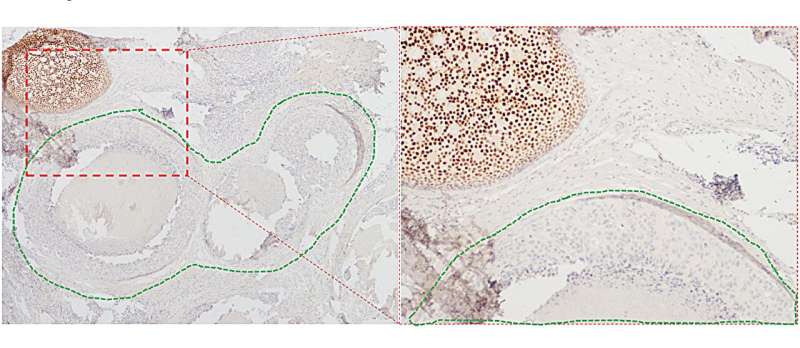This article has been reviewed according to Science X's editorial process and policies. Editors have highlighted the following attributes while ensuring the content's credibility:
fact-checked
peer-reviewed publication
proofread
Multiclonality of estrogen receptor expression in ductal carcinoma in situ (DCIS)

A new editorial paper titled "Multiclonality of ER expression in DCIS—Implications for clinical practice and future research" has been published in Oncotarget.
Estrogen receptor (ER) expression is not routinely evaluated in ductal carcinoma in situ (DCIS). This may be because the prognostic role of ER in DCIS was unclear until the UK/ANZ DCIS trial in 2021 showed that lack of ER expression in DCIS was associated with a greater than 3-fold risk of ipsilateral recurrence. This was the largest (to date) case-control study nested in a DCIS randomized trial.
The meticulous study design eliminated treatment allocation bias as well as treatment-related confounding. This was also the first-ever study to show that ER expression in DCIS is multi-clonal—having very important clinical and research implications. A small proportion of otherwise ER-positive DCIS also contained carcinoma in situ (CIS) duct/s that completely lacked ER expression.
In his new editorial, Dr. Mangesh A. Thorat from Guy's and St Thomas' NHS Foundation Trust, Queen Mary University of London and King's College London discusses this study in greater detail, the clinical implications of ER status in DCIS, the potential for avoiding overtreatment and undertreatment based on ER expression, and the importance of simple clinical observations in research.
Dr. Thorat states, "This admixture of clearly ER-positive and ER-negative ducts is not the same as heterogeneity in ER expression and I labeled such DCIS cases as multiclonal DCIS even if just one CIS duct in the entire section lacked ER expression. In summary, ER is a strong and independent prognostic biomarker in DCIS and our novel clonal method is a more accurate method to assess ER status in DCIS."
More information: Mangesh A. Thorat, Multiclonality of ER expression in DCIS—Implications for clinical practice and future research, Oncotarget (2023). DOI: 10.18632/oncotarget.28450


















